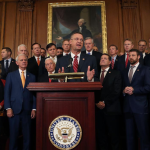A group of players in the broadcast sector are advocating for legislation that would encourage the development of domestic manufacturing capabilities to support the expansion of the local industry and reduce the growing expenses linked to the importation of digital broadcast equipment. The purpose of the proposed measure is to incentivize investment in domestic manufacturing of digital broadcast technology devices and equipment, which will lower import costs and increase the country’s economic resilience.
The fast expansion of media networks and technological advancements have led to a surge in demand for digital broadcast equipment, which has resulted in a notable rise in import costs. The dependability on foreign providers has become economically unsustainable due to the increasing need for high-quality broadcasting infrastructure across a variety of industries, including entertainment, sports, advertising, news, and education.
Industry experts are pushing for targeted policies like legislation and legislative change to encourage the formation and growth of local manufacturing facilities and plants because they see the potential for job creation, innovation, and cost savings. The legislation’s supporters contend that building a strong domestic digital broadcast equipment manufacturing industry will lessen Nigerians’ reliance on imports, boost economic growth, and improve their country’s technological prowess.
“This action offers a fantastic chance to support our manufacturing industry, which has struggled recently as a result of increased import costs and worldwide competition. We can create the groundwork for long-term economic growth and prosperity by strengthening our domestic economy and lowering our cost of imports. Jonah Ubanmhen, the frontier who is leading the Digital Awareness Initiative, stated in an interview that he “sees this as a major paradigm shift that can spark the motor of our nation’s industry.”
The proposed legislation contains several noteworthy features, such as infrastructural development, funding for research and development projects, streamlined regulatory procedures, and assistance for workforce training efforts specifically designed for the digital broadcast manufacturing industry. Policymakers hope to entice both foreign and domestic investors to contribute to the growth of the nation’s manufacturing base by fostering an environment that is favorable to investment and innovation.
This legislation, in the opinion of many legislators, including trade associations, tech firms, and consumer advocacy groups, is essential to bolstering Nigeria’s capacity for digital broadcast manufacturing and setting the nation up for independence in the digital media sphere.
The DAI group emphasises the significance of carefully crafting any legislative measures to promote fair competition, increased private-sector involvement, and uphold environmental and labour standards, while acknowledging the enormous potential and benefits of encouraging domestic manufacturing. They state that “by nurturing a competitive and sustainable manufacturing sector for digital broadcast equipment, this position the nation as a global leader in media technology innovation.”
Chinwe Adigwe, the group advisory officer, implores legislators to promptly approve this legislation to fully realise the potential of the country’s domestic digital manufacturing industry. “By encouraging investment in domestic manufacturing of digital broadcast equipment, stakeholders can aim to foster innovation, create jobs, and strengthen the nation’s economic resilience in an increasingly competitive global market. The proposed legislation represents a proactive step towards addressing the challenges post-rising import costs in the digital broadcast manufacturing sector.” She stated
Policymakers are asked to stay dedicated to creating a climate that supports innovation, entrepreneurship, and inclusive growth, and must strike a balance between the need to balance commercial interests with more general social and environmental concerns as the debate over new legislation progresses. However, this is expected to signal a bright future for Nigeria’s digital broadcast manufacturing sector and lower import prices for the digital broadcast industry with the correct cooperative efforts between the government and stakeholders.








